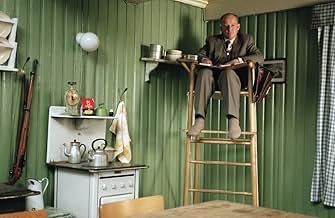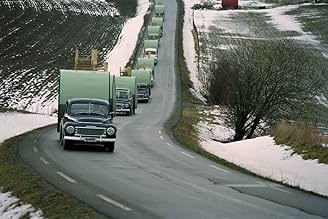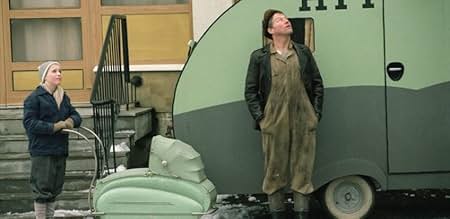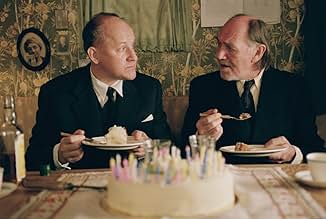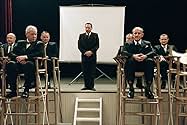IMDb RATING
7.3/10
8.8K
YOUR RATING
A scientific observer's job of observing an old cantankerous single man's kitchen habits is complicated by his growing friendship with him.A scientific observer's job of observing an old cantankerous single man's kitchen habits is complicated by his growing friendship with him.A scientific observer's job of observing an old cantankerous single man's kitchen habits is complicated by his growing friendship with him.
- Awards
- 8 wins & 7 nominations total
Gard B. Eidsvold
- Bakkerman
- (as Gard Eidsvold)
- Director
- Writers
- All cast & crew
- Production, box office & more at IMDbPro
Featured reviews
This film was a surprise since we went without any preconceptions, having avoided reading about it beforehand. It is a droll attempt at film making by Bent Hamer, the director, who collaborated on the scenario.
The film presents a story that on its surface seems to be one thing, but deep inside there is an ode to friendship between two different, but stoic Scandinavian men, Isak and Folke, whose lives become entwined as they discover how they are similar, despite of all appearances. The story is set in the bleak and snowy Norwegian winter.
In the end, Folke is a better man by having known Isak, the man who he doesn't understand at the beginning of the story, but who unknown to him, was always looking over him, without the other one knowing it.
The three principals are very well portrayed. This film will resonate with people that find themselves alone at the last stages of their lives, and how they are changed by opening up to perfect strangers who are going through the same thing themselves.
The film presents a story that on its surface seems to be one thing, but deep inside there is an ode to friendship between two different, but stoic Scandinavian men, Isak and Folke, whose lives become entwined as they discover how they are similar, despite of all appearances. The story is set in the bleak and snowy Norwegian winter.
In the end, Folke is a better man by having known Isak, the man who he doesn't understand at the beginning of the story, but who unknown to him, was always looking over him, without the other one knowing it.
The three principals are very well portrayed. This film will resonate with people that find themselves alone at the last stages of their lives, and how they are changed by opening up to perfect strangers who are going through the same thing themselves.
There's no avoiding it: "Kitchen Stories" is hopelessly boring. It is slow, uneventful, tacit, and wry. But that is not necessarily a bad thing. It also happens to be hilariously understated and brilliantly dry. It's motive is clear and straightforward, there are no surprises or twists, only the observation of two men: one who must observe, the other who must be observed. Of course, humans are not meant to be that way, and everything falls out of the way it is supposed to. The scientific study of single male's kitchen activities is carried out in high chairs strategically placed in the corner of the kitchen. But the observer, Folke, and the observed, Isak, form a friendship and a bond, quietly, and ever so slowly. There is a small twist at the end, but when you think about it, with all of the very small funny moments leading up to it (getting radio stations through a gold tooth, Isak eating dinner in his room instead of his kitchen), you realize at the end that everything is the way it should be. This movie is a small masterpiece, slow and dry, yet hilarious and perfect. This is a movie with no villains and no heroes, just regular people, eating in their kitchen. At the end, even though you may have looked at your watch a few times, you leave satisfied and with a silly little grin on your face.
My grade: 7.5/10
My grade: 7.5/10
The title may not be alluring. In fact, "Kitchen Stories" could be misleading to some that it'd be more of a women movie. Far from it - though it all may have started with the 'dazzling' multi-tetrahedrons of a chart that the self-satisfied scientist boasts of demonstrating findings on women's activity traffic in a kitchen. The snappy music sets me quite at ease in spite of anticipating reading subtitles - the melodic and light drum beats, chorus behind main vocal, sax/trumpet/trombone sounds - it's easy swinging tunes, indeed. The official site from filmsdulosange.fr gives you a feel of the 50's and a sampling of the jingle-like jazzy tune.
"Kitchen Stories" is an absolutely delightful piece. It's about a meticulously organized scientific research in the '50's on studying the kitchen behavior of single Norwegian men by assigned researchers from Sweden, in the name of advancement, of course - to improve kitchen activity efficiency. Sounds awfully dry? How can watching two men watching each other be interesting? Ah, to the genius of director Bent Hamer, who co-wrote and co-produced with Jörgen Bergmark, the film is simple enjoyment and relaxing fun. It's the discerning humor of observing human behavior of all parties involved: neighbor and neighborhood doctor, researcher and target subject, boss man and his boss - it's a film to relish and bemused upon.
Having had graphic arts, any pattern catches my eye. The opening scene - the caravan of the nine trailers each with an interesting form seen at the top of the trailer presented quite an engaging sight. Towards the end, one would realize - ah, it's that indispensable high umpire chair! Truly a well-made film and down to earth charming in all its naturalness - yes, engaging even with all the 'silent,' 'quiet,' 'observing' scenes - within and without the house.
It's also intriguing: what's happening elsewhere/upstairs while Folke Nilsson sat so quietly alone in the dark in that kitchen observation station of Isak's; what's Isak's thinking while he's piping; Grant the neighbor, what's he up to watching without a word in the cold darkness. And in the name of science, we are given insights to the 'body electric' static radio tuning.what am I talking about? Ha, that's another smilingly amusing reason to enjoy "Kitchen Stories." Thanks to the subtitles by Nick Norris, we get steady doses of chuckle and bemusing smiles throughout the film. The two main leads, Joachim Calmeyer as Isak and Tomas Norström as Folke, are fantastically 'wry' in their own self-bemused way, complementing each other's performance.
Not everything's indoors per se, there are impressive snowy landscapes, light of dawn and dead of night scenes by cinematographer Philip Øgaard. There's also a touching side story revolves around a faithful companion of a horse, and an anticipated red horse. It's full of little sprinkles of surprises and details, down to the specific food that Folke likes. Do enjoy this film. Bemused is the word repeatedly reinforced.
"Kitchen Stories" is an absolutely delightful piece. It's about a meticulously organized scientific research in the '50's on studying the kitchen behavior of single Norwegian men by assigned researchers from Sweden, in the name of advancement, of course - to improve kitchen activity efficiency. Sounds awfully dry? How can watching two men watching each other be interesting? Ah, to the genius of director Bent Hamer, who co-wrote and co-produced with Jörgen Bergmark, the film is simple enjoyment and relaxing fun. It's the discerning humor of observing human behavior of all parties involved: neighbor and neighborhood doctor, researcher and target subject, boss man and his boss - it's a film to relish and bemused upon.
Having had graphic arts, any pattern catches my eye. The opening scene - the caravan of the nine trailers each with an interesting form seen at the top of the trailer presented quite an engaging sight. Towards the end, one would realize - ah, it's that indispensable high umpire chair! Truly a well-made film and down to earth charming in all its naturalness - yes, engaging even with all the 'silent,' 'quiet,' 'observing' scenes - within and without the house.
It's also intriguing: what's happening elsewhere/upstairs while Folke Nilsson sat so quietly alone in the dark in that kitchen observation station of Isak's; what's Isak's thinking while he's piping; Grant the neighbor, what's he up to watching without a word in the cold darkness. And in the name of science, we are given insights to the 'body electric' static radio tuning.what am I talking about? Ha, that's another smilingly amusing reason to enjoy "Kitchen Stories." Thanks to the subtitles by Nick Norris, we get steady doses of chuckle and bemusing smiles throughout the film. The two main leads, Joachim Calmeyer as Isak and Tomas Norström as Folke, are fantastically 'wry' in their own self-bemused way, complementing each other's performance.
Not everything's indoors per se, there are impressive snowy landscapes, light of dawn and dead of night scenes by cinematographer Philip Øgaard. There's also a touching side story revolves around a faithful companion of a horse, and an anticipated red horse. It's full of little sprinkles of surprises and details, down to the specific food that Folke likes. Do enjoy this film. Bemused is the word repeatedly reinforced.
As a result of a study in the 1950s in which efficiency experts at the Home Research Institute observed the kitchen habits of Swedish housewives to come up with a better workspace design, eighteen men are transported in caravans to farms in Norway to observe the cooking habits of Norwegian single men. Kitchen Stories, a quirky comedy co-written by Swedish director Bent Hamer and Norway's Jörgen Bergmark, depicts the relationship between two elderly single men, a relationship in which the observer ends up being the observed. The film is similar, in its deadpan humor and offbeat characters, to the work of Aki Kaurismäki, but without the Finnish director's overbearing self-consciousness.
The scientists wear white lab coats and carry clipboards, seemingly poised for an ET-like invasion. The observers, however, must live outside the homes of their subjects in small trailers and are not allowed to talk, drink, or otherwise interact with their subjects. Some, however, are not willing subjects. One of the scientists, Folke, a Swede (Tomas Norström), draws Isak (Joachim Calmeyer), an antisocial Norwegian farmer used to living in solitude. Isak at first refuses to let Folke into his house, resentful that the horse he was promised in return for his participation turned out to be a figurine. Folke, however, eventually gains access to the kitchen and sits every day perched in his high observation chair, recording Isak's every movement like the Lord High Executioner until Isak decides to take his hot plate up to his bedroom to frustrate his unwelcome guest.
The sly Isak drills a hole through the upstairs bedroom floor and now secretly watches Folke in the kitchen. When they start conversing, each man insists on speaking his own language (not shown by the subtitles) as if to doggedly maintain their separate identities. Gradually they become friends, breaking through the barriers in their life that have imposed a limiting solitude. They begin first by drinking coffee in the morning, sharing a bit of their background, and then celebrating Isak's birthday with cake and bourbon whiskey. Their interaction, of course, is against the rules of the study, and there are consequences for Folke. His life, however, acquires new meaning the more willing he is to take risks and share himself openly. Kitchen Stories is a small film, but one that is warmhearted and thoroughly enjoyable, a work that celebrates the small pleasures in just being alive without trying to be profound or seduce us with blatant emotional appeals.
The scientists wear white lab coats and carry clipboards, seemingly poised for an ET-like invasion. The observers, however, must live outside the homes of their subjects in small trailers and are not allowed to talk, drink, or otherwise interact with their subjects. Some, however, are not willing subjects. One of the scientists, Folke, a Swede (Tomas Norström), draws Isak (Joachim Calmeyer), an antisocial Norwegian farmer used to living in solitude. Isak at first refuses to let Folke into his house, resentful that the horse he was promised in return for his participation turned out to be a figurine. Folke, however, eventually gains access to the kitchen and sits every day perched in his high observation chair, recording Isak's every movement like the Lord High Executioner until Isak decides to take his hot plate up to his bedroom to frustrate his unwelcome guest.
The sly Isak drills a hole through the upstairs bedroom floor and now secretly watches Folke in the kitchen. When they start conversing, each man insists on speaking his own language (not shown by the subtitles) as if to doggedly maintain their separate identities. Gradually they become friends, breaking through the barriers in their life that have imposed a limiting solitude. They begin first by drinking coffee in the morning, sharing a bit of their background, and then celebrating Isak's birthday with cake and bourbon whiskey. Their interaction, of course, is against the rules of the study, and there are consequences for Folke. His life, however, acquires new meaning the more willing he is to take risks and share himself openly. Kitchen Stories is a small film, but one that is warmhearted and thoroughly enjoyable, a work that celebrates the small pleasures in just being alive without trying to be profound or seduce us with blatant emotional appeals.
Having just seen Kaurismaki's dryly-witty `Man Without a Past,' I couldn't believe that director Bent Hamer's `Kitchen Stories' is actually drier and funnier. The Norse/Swedish co-production depicts 1950's Swedes studying bachelors in their kitchens to improve their lives. Swedish scientist Folke, in a high chair like some infantile god, observes Norwegian Isak under the restriction that he must not interact with Isak.
The humor comes from the stereotypical Swede as uptight and organized and the Norwegian as slow but solid. The silliness of the experiment itself is obvious and the restriction ludicrous because of course they will interact, in fact bond, given the loneliness of Norway's winter and the need for humans to be sociable. That the story turns on male bonding is a bonus, especially because neither country is considered a bastion of sociability. When Isak lets Folke listen to the radio on his teeth fillings, I figure the guys are in for some warm nights.
In another way, this film could be as good as it gets for analyzing the effect observers have on their subjects, be it laboratory or media. A question probably unanswerable even today is how much anyone changes under observation. In the case of the central characters in `Kitchen Stories,' the change is considerable, but more so just because of another human being's presence in an otherwise lonely world. The credibility of documentaries and scientists is on the table here.
The minimal dialogue and occasional joke, spiced with subtle racial stereotyping, makes me think of not only Kaurismaki but also Beckett, whose waiting characters sometime talk nonsense, but most of the time profundity under the guise of simplicity. `Kitchen' is a slow but rewarding film that strips life of its pretensions to study more closely the tissue that binds humanity with communication.
Diplomat Dag Hammarskjold in his Markings caught the minimalism of this film: `Friendship needs no words-it is solitude delivered from the anguish of loneliness.'
The humor comes from the stereotypical Swede as uptight and organized and the Norwegian as slow but solid. The silliness of the experiment itself is obvious and the restriction ludicrous because of course they will interact, in fact bond, given the loneliness of Norway's winter and the need for humans to be sociable. That the story turns on male bonding is a bonus, especially because neither country is considered a bastion of sociability. When Isak lets Folke listen to the radio on his teeth fillings, I figure the guys are in for some warm nights.
In another way, this film could be as good as it gets for analyzing the effect observers have on their subjects, be it laboratory or media. A question probably unanswerable even today is how much anyone changes under observation. In the case of the central characters in `Kitchen Stories,' the change is considerable, but more so just because of another human being's presence in an otherwise lonely world. The credibility of documentaries and scientists is on the table here.
The minimal dialogue and occasional joke, spiced with subtle racial stereotyping, makes me think of not only Kaurismaki but also Beckett, whose waiting characters sometime talk nonsense, but most of the time profundity under the guise of simplicity. `Kitchen' is a slow but rewarding film that strips life of its pretensions to study more closely the tissue that binds humanity with communication.
Diplomat Dag Hammarskjold in his Markings caught the minimalism of this film: `Friendship needs no words-it is solitude delivered from the anguish of loneliness.'
Did you know
- TriviaAt the beginning of the film, Malmberg (a Swede) becomes ill after having to drive on the right side of the road in Norway. Today both countries drive on the right. In 1967, Sweden switched to the right because making two versions of cars like Volvos and Saabs for domestic and foreign sales was inefficient. Also, there are many unguarded, unmarked border crossings points (unlike the crossing in the film); people would not realize which country they were in and sometimes ended up driving on the wrong side.
- SoundtracksVisa Från Utanmyra
Performed by Jan Johansson
- How long is Kitchen Stories?Powered by Alexa
Details
- Release date
- Countries of origin
- Languages
- Also known as
- Kitchen Stories
- Production companies
- See more company credits at IMDbPro
Box office
- Gross US & Canada
- $351,235
- Opening weekend US & Canada
- $48,103
- Feb 22, 2004
- Gross worldwide
- $2,823,472
- Runtime
- 1h 35m(95 min)
- Color
- Sound mix
- Aspect ratio
- 1.85 : 1
Contribute to this page
Suggest an edit or add missing content


